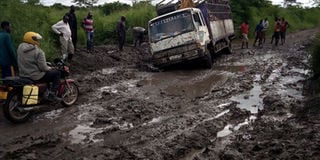Stop escalation of climate change

Stuck. A truck is stuck on Alenga-Kungu road in Apac District on August 27. PHOTO BY SANTO OJOK
What you need to know:
The issue: Climate change
Our view: We must undertake alternative and cleaner sources of energy and livelihoods to avoid escalation of climate change.
The country has in the last few years been hit by devastating weather conditions, escalating in recent months and inflicting unqualifiable destruction of life and property. Many roads in the country are virtually impassable because of these adverse conditions.
On Tuesday, River Nile burst its banks and flooded the highway, cutting off the main access route to West Nile, DR Congo and South Sudan. Eastern region too has suffered similar or worse weather conditions with mudslides burying people and destroying property. Also parts of western region have not escaped the wrath either.
There are relentless calls for urgent government intervention such as humanitarian relief, repairing damaged roads and bridges. But these will not address the problem. Weather conditions have never been this bad in the country’s history. The current conditions point to the deteriorating climate change, situation that is rapidly moving towards a point of no return. We must address that. No other intervention will reverse the situation.
A new report released by the Ministry of Water and Environment, indicates that the country’s gas emission levels have nearly doubled since 2005, contrary to the 2015 Paris Agreement, to which Uganda is a signatory, which obliges every country to maintain gas emission levels at 25-28 per cent. Degradation of our land and forests, wetlands and water bodies, has occasioned enhanced heat waves, droughts, floods and storms that are striking the country today.
Prime Minister Ruhakana Rugunda rightly captured this reality at the ongoing Heads of State and Government Climate Change Summit in Real Madrid, Spain on Tuesday.
“Uganda’s vulnerability to climate change and its associated impacts have seen our country experience unprecedented floods, droughts and landslides, among many effects that have led to loss of lives, property and livelihoods,” Dr Rugunda told the summit and called for concerted effort to address climate change effects.
That’s what we should do. We must protect the existing wetlands, forests and rivers and restore the degraded ones by adopting ambitious measures to reduce green house emissions and tame global warming. We must undertake alternative and cleaner sources of energy and livelihoods to avoid escalation of climate change to an irreversible point.
The world’s efforts to stop climate change have been inadequate and UN Secretary General Antonio Guterres has warned the global warming could pass a “point of no return.”
“The point of no return is no longer over the horizon. It is in sight and hurtling toward us,” Guterres told government representatives in Madrid this week.




